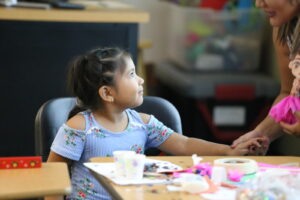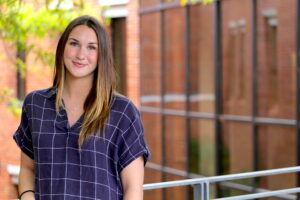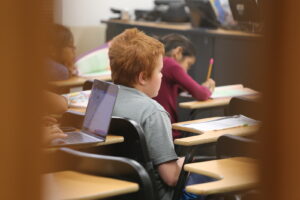Turbulent events around the world have caused an increase in the number of refugees seeking safer places to live. Uprooting and moving a family is stressful, but leaving behind your country can cause even more trauma. Children in particular can have a hard time adjusting to a new home. Combined with economic stressors and being surrounded by a new culture, these factors contribute to poor educational outcomes and limit chances for success.

Recognizing that education is essential to unlocking future opportunities and that migrant, immigrant and refugee children are at risk of dropping out of school, students at Florida State University started the Migrant and Refugee Education Alliance, now known as Darasa (a Swahili word meaning “classroom”). The students began helping refugees and migrant children in the Tallahassee community. The organization started with just eight student volunteers. It didn’t take long for more and more students to flock to the organization, and membership continued to grow. They currently have 90 members tutoring refugee children in the local area. These student-tutors provide support to Leon County Schools and instructors who are dealing with a sudden influx of new students from other countries. In total, the organization supports 20 K-12 schools, home to hundreds of migrant, immigrant and refugee students. Darasa hopes to eventually reach even more school districts and help students across America.
Working with Migrant, Refugee and Immigrant Students
Molly McQueeney, the president of the student organization, started working with the organization during her freshman year in an effort to learn more about refugees living in her local community. Over the years, she discovered the joy of working with this population and decided to run for an executive board position. “Many of our tutors have a passion for education, some for ESOL education specifically, and other tutors just love working with kids and see this as a great opportunity to support children in our local community,” she says. Madeline Walther, a student majoring in special education at the College of Education, joined the organization to satisfy a requirement for her ESOL endorsement, but soon discovered the joy of working with refugees. “If I said I wasn't extremely nervous the first time I met the refugee I was paired with, I would be lying,” she says. “Our first meeting was the generic 'let's get to know each other' conversation.

Madeline Walther, student in the FSU Special Education program[/caption] “The next time we met I felt so proud to see the change from our first meeting to our second meeting. I felt overwhelmed with happiness that I could see him come out of his bubble with me and he felt comfortable working with me. I am learning from the refugees as much as they are learning from me.” McQueeney echoes what makes Darasa such a satisfying organization to work with, saying she loves to see “their confidence grow as they begin to realize the progress they are making. When we first meet, the students are very quiet and unsure of their English abilities, but after a few weeks they have opened up, become more comfortable in their school environment, with you as a tutor, and made new friends in Tallahassee.” Darasa’s vice president, Katie Shapiro, also agrees that her favorite part about tutoring is "seeing our students progress throughout the semester. How quickly they learn new things and come out of their shell.” It goes to show just how powerful education can be. Not only does it give refugees and immigrants a brighter future, but it also helps them feel more comfortable in a new environment.
The Power of Education
McQueeney understands the full extent of what Darasa does for these students. “For our students specifically, receiving an education allows them to become fluent in English, make friends in their community, become literate, pursue higher education, improve computer proficiency, and build relationships with teachers and administrators who can provide external support, which all supports our students to become financially independent, happy, and overall successful in the future,” she says. “It is difficult for our students to immediately adapt to mainstream public education in the U.S. since many of them have never had formal education prior to moving to Tallahassee.” As is often the case, student tutors aren’t the only ones doing the teaching; many volunteers report learning from their students, says Walther. “Every greeting, I ask the refugee to teach me either a word or a phrase in their native language. The most satisfying part of working with refugees is gaining new knowledge about people who come from different backgrounds.

“Reflecting on the first time I worked with this population to now, I see immense growth in my ability to help students,” Walther adds. That’s part of what makes Darasa such an appealing organization: when volunteers and students come together, everyone benefits. Volunteers gain experience and satisfaction knowing they’re making a difference, and students gain vital skills that could change their whole life’s trajectory.


